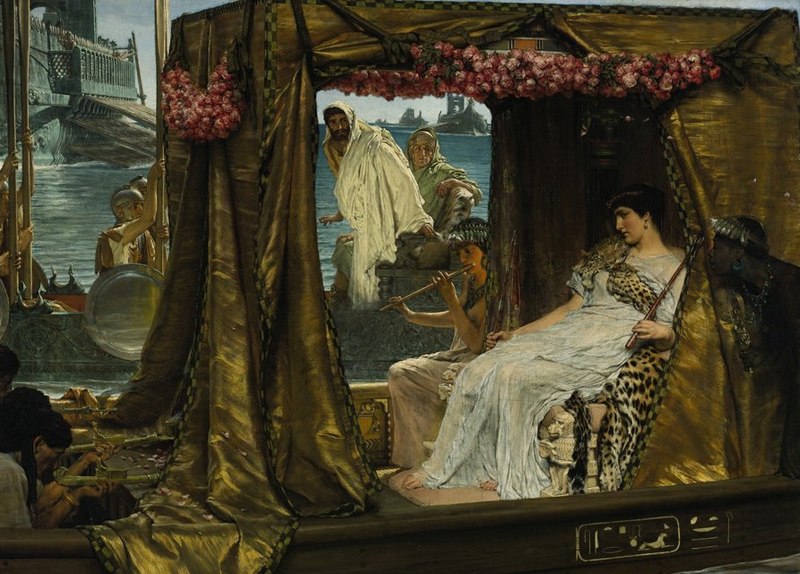From the introduction by W. J. Rolfe to an 1890 edition of Shakespeare's Antony and Cleopatra, and from Shakespeare's Plutrarch, edited by Israel Gollancz:History...merely writes the obituary of the dead past; Poetry calls it back from the grave, and makes it live again before our eyes. — W. J. Rolfe
Shakespeare calls history back from the grave in his tragic play, Antony and Cleopatra. But it's not pedantic adherence to fact and knowledge that brings the characters of Antony and Cleopatra to life. Instead, it's Shakespeare's knowledge of human nature that makes him arguably the greatest poet/writer of all time.
Shakespearean scholar W. J. Rolfe argues that the confluence of Shakespeare's natural genius and his mediocre schooling create a perfect storm of drama.
Grant the combination of pre-eminent genius with the "small Latin", and all is clear. Shakespeare's knowledge of man was almost superhuman; and as Agassiz from a single scale could reconstruct the fish, so Shakespeare from a few rudimentary facts could recreate the man or the people. His schoolboy lessons in Roman history in the Stratford Grammar School, supplemented by his later reading in a single volume, North's Plutarch, were all that he needed, outside of himself, for the production of Julius Caesar, and Antony and Cleopatra, and Coriolanus.Apparently North's translation of Plutrach's Lives really was all he needed. Shakespeare borrowed heavily and often directly from Plutarch's biographies of Caesar and Antony for his plays. Gollancz, in Shakespeare's Plutrarch, looks the plagiarism squarely in the eye.
The relation between Julius Caesar and the Lives has been already discussed. If the connection had ended with that play there would be no great reason for crediting North with a much higher sort of influence over Shakespeare than that exerted by Holinshed, Painter, Whetstone, Harsnet, and the many other authors whose matter the poet appropriated without reserve and whose manner, save for a phrase here and there, he seems utterly to have repudiated. But the indebtedness of Shakespeare to North is most striking in the latest of his Roman plays, Antony and Cleopatra and Coriolanus. A comparison of the many passages ...shows that the dramatist was satisfied in no small number of cases to incorporate whole speeches from North with the least change consistent with the production of blank verse. The description of Cleopatra's first visit to Antony, the dying speech of Antony, and the few noble lines that glorify the passing of Cleopatra, the address of Coriolanus to Tullus Aufidius when he throws himself upon the latter's hospitality, and the last all-decisive speech of Volumnia to her son—these passages, all of which rank among the special treasures of Shakespearean poetry, come straight and essentially unaltered out of North...However, Gollancz is quick to forgive:
The borrowing is a deservedly high compliment to North; it is far from being a reproach to Shakespeare. It is as Archbishop Trench has said in his lectures on Plutarch: 'Shakespeare does not abdicate his royal preeminence, but resumes it at any moment that he pleases.' To take the dying speech of Charmion and fit it indistinguishably into a setting worthy of it, to borrow nearly unchanged the words of Coriolanus to Aufidius and then to give them their needed consummation in the answer of Aufidius—this surely is a greater achievement than to have new-written the two scenes.Rolfe also gives the plagiarism a pass.
...[F]reely as the dramatist has drawn from [Plutarch], how insignificant after all is his real indebtedness to him! So far as the historical materials of the play are concerned, he may owe to him, as Trench has said, not merely the skeleton, but the flesh that clothes it; but when we compare the finished poetry with the borrowed prose, the latter appears only as the dry bones which the mighty magician has transformed into a living thing of beauty and a joy forever.Well, that may be, but don't try imitating Shakespeare's highly "unaltered" literary style at home.
Or at school.
But it's nice to know that Shakespeare, too, read the classics.
 |

